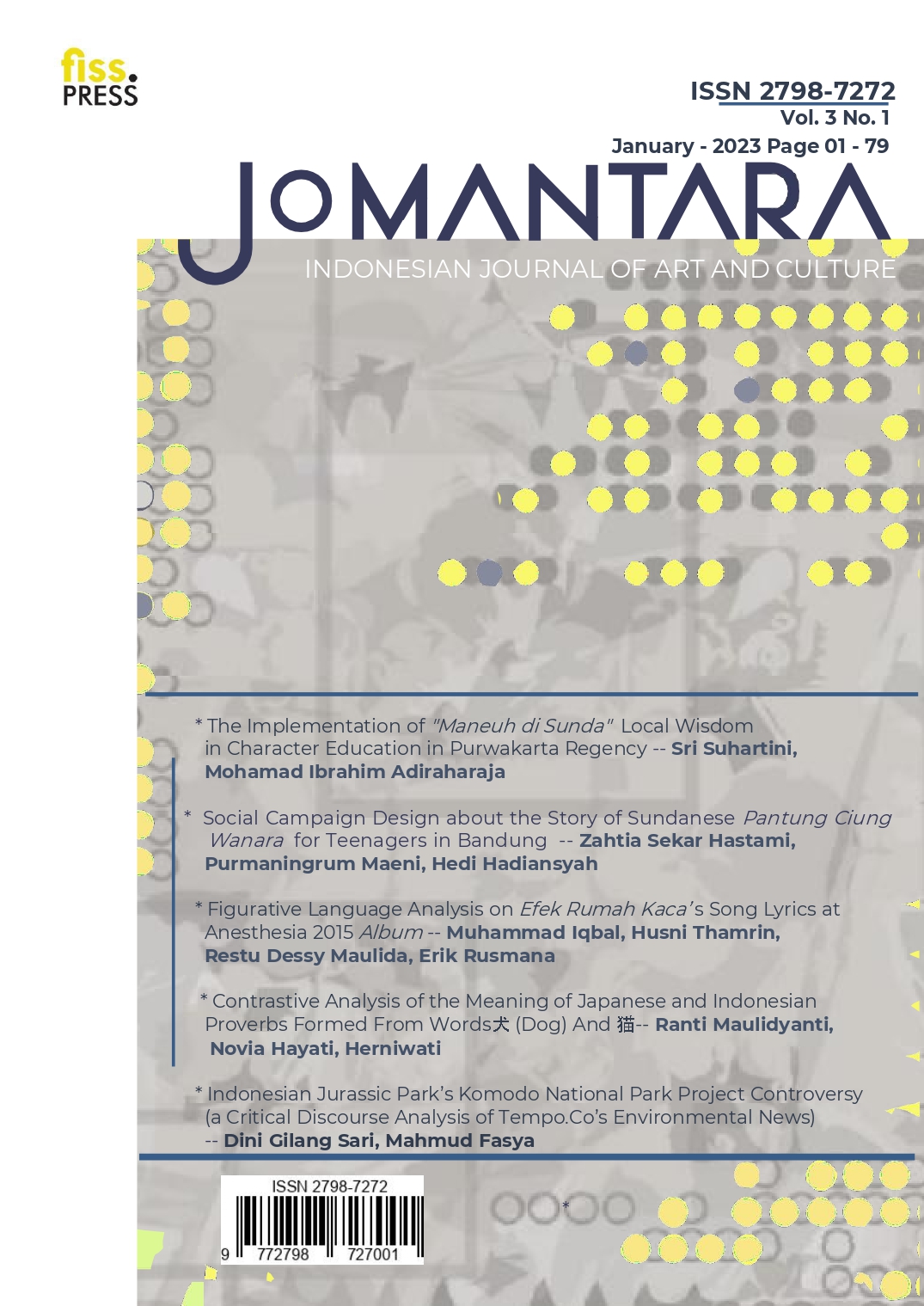INDONESIAN JURASSIC PARK’S KOMODO NATIONAL PARK PROJECT CONTROVERSY (A CRITICAL DISCOURSE ANALYSIS OF TEMPO.CO’S ENVIRONMENTAL NEWS)
DOI:
https://doi.org/10.23969/jijac.v3i1.7195Keywords:
controversy; critical discourse analysis; Komodo dragons; rejection; van DijkAbstract
This paper explains (1) macrostructure, (2) microstructure, (3) social cognition, and (4) social context in the news discourse on the rejection of the Komodo National Park Jurassic Park Project in Labuan Bajo. His presentation is expected to be a means of education about the media's partiality towards reporting on environmental issues, especially about Komodo dragons and their supporting ecosystems. Research data in the form of news discourse were studied based on the critical discourse analysis procedure of Teun A. Van Dijk's model. Macrostructure analysis shows that Tempo.co tend to dare to raise popular issues that are sensitive to the government, especially about the rejection of the Komodo National Park Jurassic Park Project in Labuan Bajo as a topic of discourse. Analysis of the superstructure shows that in delivering news about the rejection of citizens, Tempo.co so straightforwardly highlight the negative side of the news. Tempo.co also displays the comments of the characters or sources as a whole. Microstructure analysis yields several conclusions regarding meaning, word selection, sentence usage, and rhetoric displayed in the Tempo.co. The language used by journalists in voicing their views on the rejection of the Komodo National Park Jurassic Park Project in Labuan Bajo is straightforward and wordless. Journalists conveyed their intentions and details explicitly, and even journalists deliberately quoted and used the word "illegitimate" to indicate that exploitation and extraction were forbidden acts. This further confirms the position of Tempo.co in favor of environmental issues even though the risks must be contrary to government policies. Analysis of social cognition shows that this news text does not support government discourse. Analysis of the social context shows that residents' rejection of the Komodo National Park Jurassic Park project in Labuan Bajo is based on community anxiety about the threat of extinction of Komodo dragons endemic animals on Flores Island.
Downloads
References
Eriyanto. (2001). Analisis Wacana: Pengantar Analisis Teks Media. LKis Group.
JPNN.com. (2020, Oktober 3). Pulau Komodo Dipastikan Tetap Dibuka untuk Wisatawan. JPNN.com.
Kompas.com. (2020, Juli 20). Kersuakan Hutan Belum Berhenti Selama Pandemi. Kompas.com.
Maiyulinda, C. (2018). Analisis Wacana Berita Liputan Khusus Terhadap Kecenderungan Media Dalam. 6(1), 158–172.
Rusyda, A. M. (2017). Analisis Wacana Kritis Environmentalisme Reklamasi Teluk Jakarta (Studi Analisis Wacana Kritis Teun Van Dijk Struktur Mikro di Media Mongabay.co.id Periode April-Oktober 2-16).
van Dijk, T. A. (1998). Ideology: A Multidisciplinary Approach. In Sage Publication. https://doi.org/10.4135/9781446217856
Van Dijk, T. A. (1998). News as Discourse. In Lawrence ErlBaum Associates.
Zulmi, F. (2017). Keberpihakan Media Terhadap Isu Pelestarian Lingkungan Hidup. Jurnal KATA, 1(2), 101. https://doi.org/10.22216/jk.v1i2.2138
Downloads
Published
Issue
Section
License
Copyright (c) 2023 Publisher Universitas Pasundan

This work is licensed under a Creative Commons Attribution-NonCommercial 4.0 International License.
Copyright Notice

This work is licensed under a Creative Commons Attribution 4.0 International License.









